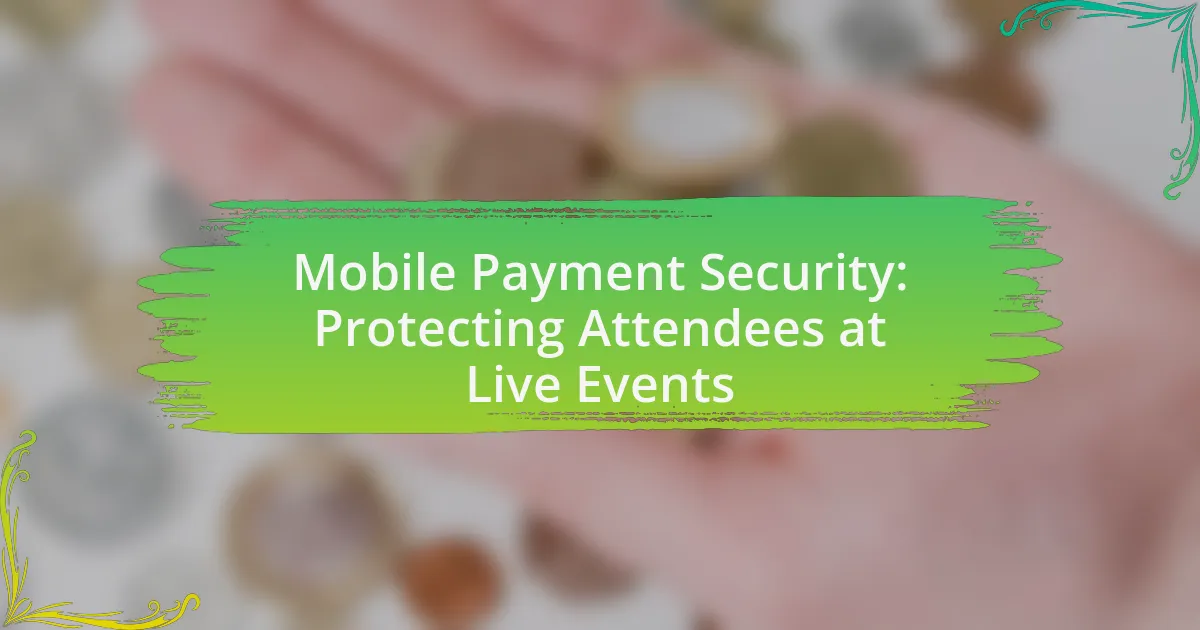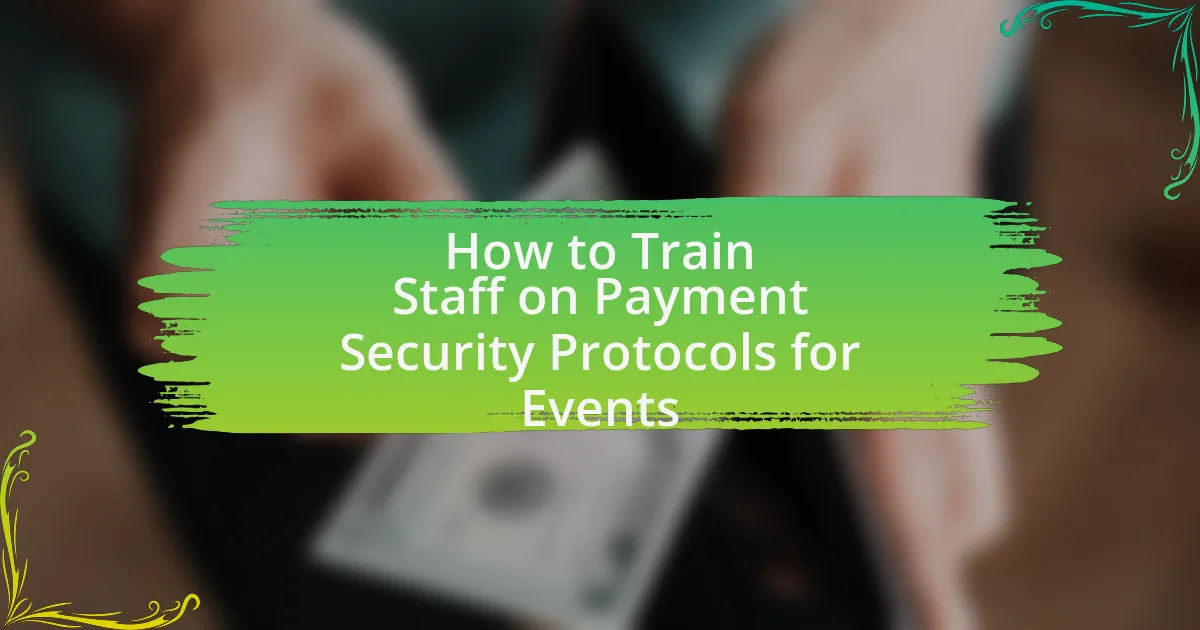Chargebacks are transaction reversals initiated by customers disputing charges, which can significantly impact event organizers financially and reputationally. This article explores the causes of chargebacks in the event industry, including fraud, customer dissatisfaction, and billing errors, and highlights their financial implications, such as lost revenue and increased fees. It also discusses the legal ramifications of chargebacks, strategies for prevention, and best practices for managing disputes effectively. By implementing clear communication, robust payment processing systems, and thorough documentation, event organizers can minimize chargeback risks and enhance their operational stability.
What are Chargebacks and Why Do They Matter for Event Organizers?

Chargebacks are transactions that are reversed by a bank or credit card issuer, typically initiated by a customer disputing a charge. They matter for event organizers because they can lead to significant financial losses, increased fees, and damage to the organizer’s reputation. According to a report by the Merchant Risk Council, chargebacks can cost merchants up to 2.5 times the original transaction amount when considering fees and lost revenue. Additionally, a high chargeback ratio can result in penalties from payment processors, making it crucial for event organizers to implement effective prevention strategies to minimize these risks.
How do Chargebacks occur in the event industry?
Chargebacks in the event industry occur when a customer disputes a transaction, leading to a reversal of funds from the merchant’s account back to the customer. This process typically happens when attendees claim unauthorized charges, dissatisfaction with the event, or failure to receive promised services. According to a report by the National Retail Federation, chargebacks can cost merchants up to 3% of their revenue, highlighting the financial impact on event organizers.
What are the common reasons for Chargebacks in events?
Common reasons for chargebacks in events include fraud, customer dissatisfaction, and billing errors. Fraud occurs when unauthorized transactions are made using stolen credit card information, leading to chargebacks as victims dispute the charges. Customer dissatisfaction arises when attendees feel that the event did not meet their expectations, such as poor organization or failure to deliver promised services, prompting them to request refunds through chargebacks. Billing errors can happen due to duplicate charges or incorrect amounts being processed, which can also lead customers to dispute the charges. According to a study by the Merchant Risk Council, approximately 40% of chargebacks are attributed to fraud, highlighting the significant impact of unauthorized transactions on event organizers.
How do Chargebacks impact event organizers financially?
Chargebacks negatively impact event organizers financially by resulting in lost revenue and additional fees. When a customer disputes a charge and initiates a chargeback, the event organizer not only loses the sale amount but may also incur chargeback fees from payment processors, which can range from $20 to $100 per incident. Furthermore, a high chargeback ratio can lead to increased scrutiny from payment processors, potentially resulting in higher processing fees or even the termination of merchant accounts. According to a study by the Merchant Risk Council, businesses face an average loss of $2.40 for every dollar lost to chargebacks, highlighting the significant financial burden they impose on event organizers.
What are the legal implications of Chargebacks for event organizers?
Chargebacks can have significant legal implications for event organizers, primarily affecting their financial liability and contractual obligations. When a customer disputes a charge and initiates a chargeback, the event organizer may face the loss of revenue from the transaction, as well as potential fees imposed by payment processors. Additionally, if chargebacks occur frequently, organizers risk being classified as high-risk merchants, which can lead to higher processing fees or even the termination of their merchant accounts. Legal repercussions may also arise if the chargeback is deemed fraudulent or if the organizer fails to provide adequate evidence to contest the chargeback, potentially resulting in further financial penalties or legal action from payment processors.
How can Chargebacks affect contracts and agreements?
Chargebacks can significantly impact contracts and agreements by altering the financial obligations and risk assessments outlined within them. When a chargeback occurs, it typically indicates a dispute between the buyer and seller, which can lead to the seller facing financial losses and potential penalties from payment processors. This disruption can necessitate renegotiation of terms in existing contracts, as event organizers may need to implement stricter payment policies or adjust refund terms to mitigate future chargeback risks. Furthermore, frequent chargebacks can damage a seller’s reputation with payment processors, potentially resulting in higher transaction fees or loss of merchant accounts, which directly affects the viability of contractual agreements.
What are the potential penalties for excessive Chargebacks?
Excessive chargebacks can lead to significant penalties for businesses, including increased transaction fees, account termination, and potential legal action. Payment processors often impose higher fees on merchants with high chargeback rates, which can escalate costs substantially. Additionally, if a merchant exceeds a certain threshold of chargebacks, they risk having their merchant account suspended or terminated, limiting their ability to process payments. Furthermore, excessive chargebacks can damage a business’s reputation with banks and payment networks, potentially leading to long-term financial repercussions.
What Strategies Can Event Organizers Use to Prevent Chargebacks?

Event organizers can prevent chargebacks by implementing clear communication, robust payment processing systems, and thorough documentation practices. Clear communication involves providing detailed event information, including terms and conditions, to attendees at the point of sale, which helps set accurate expectations and reduces misunderstandings. Robust payment processing systems should include fraud detection tools and secure payment gateways to minimize the risk of unauthorized transactions. Thorough documentation practices, such as keeping records of ticket purchases, confirmations, and attendee communications, serve as evidence in case of disputes, thereby strengthening the organizer’s position against chargebacks.
How can clear communication reduce Chargebacks?
Clear communication can significantly reduce chargebacks by ensuring that customers fully understand the terms of their purchase, including pricing, refund policies, and event details. When event organizers provide transparent information through multiple channels, such as emails, FAQs, and customer service interactions, they minimize misunderstandings that can lead to disputes. According to a study by the Federal Reserve, clear communication about transaction details can decrease chargeback rates by up to 30%, as customers are less likely to contest charges when they feel informed and supported.
What information should be included in event descriptions?
Event descriptions should include the event title, date, time, location, ticket pricing, and a brief overview of the event’s purpose or activities. Including these elements ensures potential attendees have all necessary information to make informed decisions. For instance, specifying the date and time helps avoid scheduling conflicts, while clear ticket pricing aids in financial planning. Additionally, a concise overview provides context, which can enhance interest and attendance.
How can organizers set clear expectations with attendees?
Organizers can set clear expectations with attendees by providing detailed information about the event, including schedules, policies, and any requirements for participation. This clarity helps attendees understand what to expect, reducing confusion and potential disputes. For instance, sending out a comprehensive FAQ document prior to the event can address common concerns and outline the terms of attendance, which is crucial in minimizing misunderstandings that could lead to chargebacks.
What role does payment processing play in Chargeback prevention?
Payment processing plays a critical role in chargeback prevention by ensuring secure and accurate transactions. Effective payment processing systems utilize advanced fraud detection tools, which analyze transaction patterns and flag suspicious activities, thereby reducing the likelihood of chargebacks. According to a study by the Merchant Risk Council, businesses that implement robust payment processing solutions can decrease chargeback rates by up to 30%. Additionally, clear transaction records and prompt customer service provided through payment processing can help resolve disputes before they escalate to chargebacks, further enhancing prevention efforts.
How can choosing the right payment processor help?
Choosing the right payment processor can significantly reduce chargebacks for event organizers. A suitable payment processor offers advanced fraud detection tools, which help identify and prevent fraudulent transactions before they occur. For instance, processors that utilize machine learning algorithms can analyze transaction patterns in real-time, flagging suspicious activities that may lead to chargebacks. Additionally, a reliable payment processor provides clear communication and support for dispute resolution, enabling event organizers to address customer concerns promptly and effectively, thereby minimizing the likelihood of chargebacks.
What security measures should be implemented during transactions?
To ensure secure transactions, implementing measures such as encryption, secure payment gateways, and two-factor authentication is essential. Encryption protects sensitive data by converting it into a secure format that can only be read by authorized parties, thereby reducing the risk of data breaches. Secure payment gateways facilitate safe processing of payment information, ensuring that customer data is transmitted securely. Two-factor authentication adds an extra layer of security by requiring users to provide two forms of identification before completing a transaction, which significantly decreases the likelihood of unauthorized access. These measures collectively enhance transaction security and help prevent chargebacks, which can be costly for event organizers.
How Can Event Organizers Respond to Chargebacks Effectively?

Event organizers can respond to chargebacks effectively by implementing a structured dispute resolution process. This involves gathering all relevant transaction documentation, such as receipts, communication records, and event attendance proof, to substantiate the legitimacy of the charge. According to a study by the Chargeback Gurus, providing comprehensive evidence can increase the likelihood of winning disputes by up to 70%. Additionally, maintaining clear communication with customers prior to the event can help address potential issues that may lead to chargebacks, thereby reducing their occurrence.
What steps should be taken when a Chargeback occurs?
When a chargeback occurs, the first step is to review the transaction details and gather all relevant documentation, including receipts, communication with the customer, and any evidence of service delivery. This documentation is crucial for disputing the chargeback effectively. Next, the event organizer should respond to the chargeback notification promptly, adhering to the deadlines set by the payment processor. This response should include a clear explanation of the transaction and the supporting evidence collected.
Additionally, it is important to analyze the reason for the chargeback to identify any patterns or issues that may need addressing, such as customer dissatisfaction or fraud. Implementing preventive measures based on this analysis can help reduce future chargebacks. According to the Chargeback Guide by the Electronic Payments Association, timely and well-documented responses can significantly increase the chances of winning a chargeback dispute.
How can organizers gather evidence to dispute a Chargeback?
Organizers can gather evidence to dispute a chargeback by collecting comprehensive documentation related to the transaction. This includes obtaining proof of purchase, such as receipts or invoices, and any communication with the customer, like emails or messages that confirm the transaction details. Additionally, organizers should compile evidence of service delivery, which can include event tickets, attendance records, or confirmation of participation.
To strengthen their case, organizers can also provide any relevant policies, such as refund or cancellation policies, that were communicated to the customer at the time of purchase. This documentation serves as concrete proof that the transaction was legitimate and that the customer was informed of the terms. By presenting this organized evidence, organizers can effectively dispute the chargeback and demonstrate that the claim is unwarranted.
What documentation is essential for a successful dispute?
Essential documentation for a successful dispute includes transaction records, communication logs, and evidence of service delivery. Transaction records provide proof of the purchase, including receipts and invoices, which establish the legitimacy of the transaction. Communication logs, such as emails or chat transcripts, demonstrate the interactions between the parties involved, clarifying any agreements or misunderstandings. Evidence of service delivery, such as contracts, event tickets, or photographs, supports the claim that the service was rendered as promised. Collectively, these documents substantiate the case and enhance the likelihood of a favorable outcome in the dispute process.
What are the best practices for managing Chargebacks?
The best practices for managing chargebacks include implementing clear refund policies, maintaining thorough documentation of transactions, and utilizing fraud detection tools. Clear refund policies help set customer expectations and reduce misunderstandings that can lead to chargebacks. Thorough documentation, including receipts and communication records, provides evidence to dispute chargebacks effectively. Utilizing fraud detection tools can identify suspicious transactions before they result in chargebacks, thereby minimizing potential losses. According to a study by the Merchant Risk Council, businesses that adopt these practices can reduce chargeback rates by up to 30%.
How can event organizers track and analyze Chargeback trends?
Event organizers can track and analyze chargeback trends by utilizing payment processing analytics tools and monitoring transaction data. These tools provide insights into the frequency and reasons for chargebacks, allowing organizers to identify patterns over time. For instance, analyzing chargeback data can reveal specific events or ticket types that are more prone to disputes, enabling targeted prevention strategies. Additionally, integrating customer feedback and transaction history can help organizers understand the underlying causes of chargebacks, such as dissatisfaction with services or fraudulent claims. By regularly reviewing this data, event organizers can adapt their practices to minimize future chargebacks effectively.
What proactive measures can be taken to minimize future Chargebacks?
To minimize future chargebacks, event organizers should implement clear communication and transparent policies regarding their services. Establishing detailed terms and conditions, including refund and cancellation policies, helps set customer expectations and reduces misunderstandings that can lead to disputes. Additionally, utilizing secure payment processing systems with fraud detection capabilities can significantly lower the risk of unauthorized transactions. According to a study by the Merchant Risk Council, businesses that adopt robust fraud prevention measures can reduce chargeback rates by up to 50%. Regularly monitoring transaction patterns and customer feedback also enables organizers to identify potential issues early, allowing for timely resolutions before they escalate into chargebacks.
What practical tips can help event organizers avoid Chargebacks?
Event organizers can avoid chargebacks by implementing clear communication, transparent refund policies, and secure payment processing. Clear communication involves providing detailed event descriptions and terms of service to minimize misunderstandings. Transparent refund policies should be easily accessible and clearly outline conditions under which refunds are granted, reducing disputes. Secure payment processing, including using reputable payment gateways and encryption, protects customer information and builds trust, which can decrease the likelihood of chargebacks. According to a study by the Merchant Risk Council, businesses that adopt these practices see a significant reduction in chargeback rates, highlighting their effectiveness in chargeback prevention.






